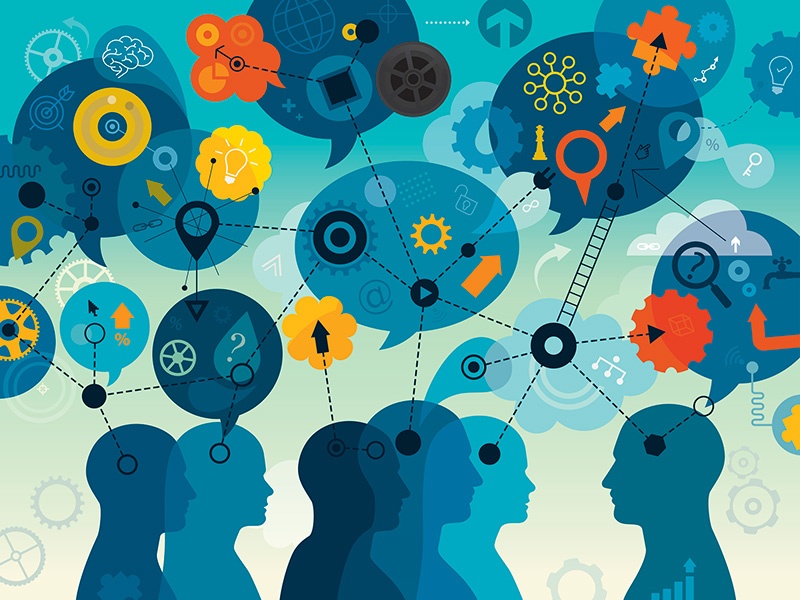This is the Future of Education

America moved from the Agrarian Age to the Industrial Age in the mid-19th Century. At that point in our history, farmers made up 64% of the population. Today, they comprise only 2% of the U.S. population. As we settle firmly in the Knowledge Age (The Third Wave), will Educators be the next great profession to lose employment to machines?
The global education system is undergoing a dramatic transformation. For much of the past 150 years, education has been based on the Industrial Age model. Students move along an assembly line, collecting information as they progress. Society generally expects a student to select an area of focus and spend a career there. In this model, those who control the industry control the power.
In the Third Wave, that model is increasingly antiquated. We’re moving from a segmented, task-oriented environment to a more fluid one that prioritizes the production and flow of information. Power is shifting from knowledge producer to knowledge consumer – and it is forcing change on the traditional Industrial Age model of education.
Trends to Watch
Advancing technology, mounting consumer power, and broad micro- and macroeconomic factors are converging. Each of these major drivers will have specific implications for the business of education and the economy as a whole.
As education and evaluation technologies advance, students are increasingly empowered to seek unconventional and interconnected learning systems that provide massive amounts of content and enable a lifelong pursuit of learning. That’s fortunate due to rising costs of traditional education forcing students and educational institutions to explore new models of learning, teaching, and business. Soon, machines and augmented reality will proliferate education systems.
Students expect measurable outcomes and tailored personalized education to prepare them for the future. And the myriad of “downstream” markets does too – they are reliant on schools to provide them with a workforce prepared to achieve in the Knowledge Age.
The Three Key Developments Reshaping Third Wave Education
Educators and employers prepared to adapt quickly to these demands will be well positioned to capitalize on the many opportunities presented by this transformation. Those that are striving to prioritize their efforts are focusing in on three main trends – unconventional learning models, Learning Agents[1], and Learning Analytics[2].
Unconventional Education Models
Rising education costs are pushing consumers to seek out less expensive, more tailored solutions for their education needs. Already, technology has opened gateways for collaboration among students, educational institutions, and other stakeholders. And as connectivity becomes even more ubiquitous, that collaboration will broaden. For example, “crowdsourced” learning environments[3] give students access to unlimited knowledge sources in unlimited subject areas. These peer-to-peer learning environments rival the expert-to-student teaching found in traditional models.
Value of Learning Agents
At every level, institutions are confronted with rising costs and competition from attractive alternatives. They are challenged to maintain student enrollment. In particular, traditional institutions must work harder than ever to differentiate themselves and vie for tuition revenue in a crowded market. They will need to identify new business models and/or unique ways to provide the value sought by consumers.
One unique approach is “Learning Agents” who provide students a comprehensive support system by developing learning plans, recommending external courses or learning programs, consulting with workforce insiders to identify trends in in-demand skillsets, and supporting students as they search for jobs. These Learning Agents become a source of support for lifelong learners, providing mentorship as they progress through their professional careers.
Data-Driven, Personalized Education
Education is not immune to the lure of big data. Fortunately, technologies and platforms capable of collecting and analyzing vast amounts of information are becoming easier to use and less expensive to operate. The ability to leverage learning analytics will help institutions make rapid and informed decisions about which courses and experiences to maintain, which to discontinue, and which to modify to meet market demands. Learning analytics will even engage predictive modeling to analyze strengths and weaknesses of a student’s learning to inform the development of new, more appropriate courses.
As we’ve seen at every inflection point throughout history, transformation can be disruptive, messy, and risky. It can also be a source of incredible opportunities. For those organizations agile enough to capitalize on the many changes happening in the global education system, the opportunities are vast. Early adopters, those organizations brave enough and able to embrace the changes, stand to reap the greatest benefit. Through strategic foresight and shrewd change management, today’s organizations can be ready for what the future holds.
It’s time to embrace education in the Knowledge Age and prepare our students to learn, unlearn, and relearn.
{{cta(‘c254ce44-075c-42d8-8fb5-4887c026f5c7’)}}
[1] Learning Agents will take the role as mentor, coach, and counselor for students throughout their lifelong learning plan. They will help the student translate learning that occurs outside of schools (e.g. unconventional learning, extracurricular experience/training, etc.) into marketable skillsets seen as valuable to potential employers.
[2] Learning Analytics is defined as the measurement, collection, analysis, and reporting of data about learners, for purposes of understanding and optimizing learning and the environments in which it occurs.
[3] Crowdsourced learning is the practice of students obtaining knowledge, ideas, or concepts by soliciting contributions from peers in a global online community.
- Categories
- Futures and Foresight
- Workforce of the Future

 About the Authors
About the Authors